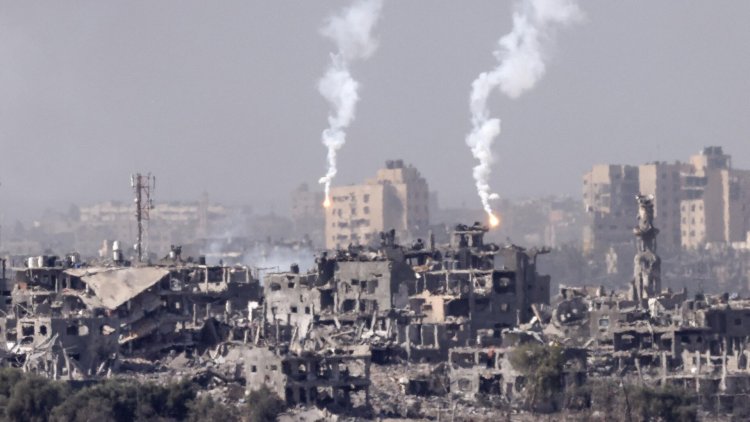Palestine Conflict: Two Parts to India’s Response
STORIES, ANALYSES, EXPERT VIEWS

One day before foreign and defence ministers of India and the United States in Delhi jointly ‘expressed their support for humanitarian pauses’ in Israel’s war in Gaza—but not an end to the conflict—New Delhi voted in favour of a UN General Assembly resolution condemning ‘Israeli settlements’ in 'Occupied Palestinian Territory'.
Still largely unspoken, Jyoti Malhotra (senior consulting editor at ThePrint) writes there is the “sentiment in India that Israel’s war against the Palestinians in Gaza has become revengeful…”
There are two parts to the Modi government’s response to the current Israel-Palestine conflict, writes Malhotra. The first is his tweet within hours of the horrific 7 October massacre by Hamas expressing ‘solidarity’ with Israel. “This must be understood as the government’s fundamental belief that terrorism must be opposed at all costs.
“The second part of New Delhi’s response is aimed at moderating the view that India has abandoned its moral and diplomatic support of Palestine — and by implication, cares little for Arab opinion — because it firmly believes in the Israeli cause."
That is why, “the Ministry of External Affairs has been trying to re-balance its posture on this very grave and sensitive issue so as not to appear too pro-Israel in public.”
The conflict and India’s position
The 27 October abstention on the Jordanian-sponsored resolution is a case in point. India, states Malhotra “understood that abstaining, at a grave and sensitive time as this, made it look like it had fallen between two stools — unable to fully support its fast friend Israel and advocate for the Palestinian cause….”
But some would argue that India has abstained several times in the past and made its point, for example, on the Russia-Ukraine conflict. That ‘abstention’ was pretty much a pro-Russia vote in reality.
The big difference between the Ukraine and Gaza abstentions is that more people have been killed in Gaza in the past month than in the year and a half since Russia went to war with Ukraine. Moreover, “the simple act of counting body bags goes beyond moral outrage. Especially when about half of those are children.”
Still, argues Malhotra “there remains the simple matter of India and Israel being special friends — from defence to agriculture cooperation as well as ideological proximity between PM Modi and his counterpart Benjamin Netanyahu. Under the circumstances, how could Modi be seen as unsupportive of Bibi?"
India’s stand: And so, “S Jaishankar, has been pushed to moderate India’s position and return it from the far-Right that favoured Israel to the Centre. He called Iran’s foreign minister Hossein Amir-Abdollahian on the Gaza crisis, knowing full well that Iran’s Supreme Leader Ayatollah Khamenei only recently met the Hamas leader Ismail Haniyeh in Tehran.
“Here, then, is the deal: India voted against the Israel resolution at the UN, hours before US Secretary of State Antony Blinken and US Defence Minister Lloyd Austin arrived in Delhi for the 2+2 dialogue, knowing full well that few care about UN General Assembly votes. All in all, it was a small price to pay for creating a diplomatic fog about where India’s sympathies really lie.”
Ideological aspect of India’s foreign policy
Parsa Venkateshwar Rao Jr (Delhi-based commentator and analyst) looks at the ideological aspect of India’s position.
That Prime Minister Narendra Modi went all out to condemn Hamas’ attack on Israel on October 7, “reflected the ideological bias of the Bharatiya Janata Party, and Mr Modi was conforming to the party’s long-standing position, which goes back to the days of the BJP’s predecessor, the Bharatiya Jan Sangh. The right-wing Hindutva party saw the Palestine-Israel question as one between Muslims and Jews, and it came from its domestic anti-minority stance, which really translates into anti-Muslim. It was also less complicated for Mr Modi to stand up and stand with Israel because the attack came from Hamas, an Islamist group that has started out as a Palestinian wing of Egypt’s Muslim Brotherhood, and Hamas was also a terrorist organisation in the American list.”
BJP’s doctrinal preference for Israel: The BJP’s doctrinal preference for Israel over Palestine, argues Rao Jr “was strengthened by Hamas attacking civilians in southern Israel, which included women, children and old people, and also taking more than 200 of them hostage. There could not have been a clearer case for righteous indignation of the right-wing folk in India. The spectre of Islamic terrorism came alive once again, well over 20 years after the 9/11 terror attacks in New York and Washington, attributed to Al Qaeda, and almost 15 years since the Lashkar-e-Tayyaba’s 26/11 attack on Mumbai. Hamas is being seen as the return of the ghost of Al Qaeda.”
But realising that India cannot afford to take an overtly partisan position, “Mr Modi tried to balance his vocal support for Israel……with calls to Egyptian President Abdel Fattah El-Sisi and UAE President Sheikh Mohamed Bin Zayed Al Nahyan……The Indian government then made a tepid announcement of token humanitarian aid to the civilians in Gaza in late October.”
Political mileage for BJP: The fact however, is that “India’s position on the Hamas-Israel confrontation is quite different from that of its stance on the Russia-Ukraine war…..The Modi government is more in alignment with the West on the war in Gaza because it knows the fault lines in the Palestinian territories and in West Asia generally…..The Arab governments have not condemned the Hamas attack and they had been seeking a de-escalation from the beginning, but they are not condemning Israel outright. This gives a lot of wiggle room for India and the BJP government of Mr Modi. The Hindutva whisper campaign about Islamic terrorism in the wake of the Hamas attack is alive on the social media. Mr Modi and the BJP will derive maximum mileage out of it in the 2024 Lok Sabha election.”















